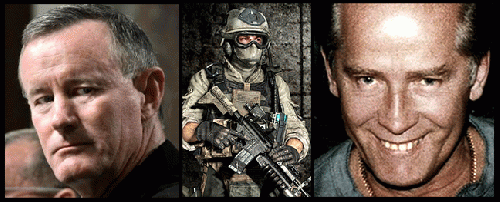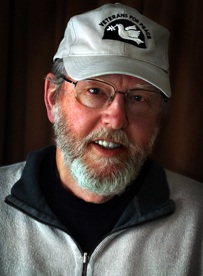If a young computer nerd like Edward Snowden can access so much secret information concerning US citizens' lives, what's to stop some righteous NSA employee with the moral intelligence of Adolf Eichmann from accessing the same material and, in collusion with a para-military cabal of like-minded and armed patriots, deciding someone (me!) is a national security threat in need of neutralization?

Adm. William McRaven, head of Special Ops Command and mob killer Whitey Bulger
(Image by unknown) Details DMCA
At an anti-Iraq War demonstration in Philadelphia some years ago, a Civil Affairs cop took me aside and told me the FBI had just called him about me. He seemed to be warning me so I could clean up any suspicious behavior. Since I was exercising my first amendment rights, I felt I had nothing to hide. But, then, I began to wonder why exactly some FBI drone thought I might be a threat and how dangerous for me such a person might be.
It all distills down to Power versus Truth and which one is the lodestar for one's actions. The Obama administration's current obsession with crushing whistleblowers is clearly about Power and assuring the bloated national security apparatus he oversees retains all its accumulated Power. This is done by controlling access to the Truth.
In his 2011 book The Future of Power, Joseph Nye, Jr. says we live in an age of the "diffusion of power" in which the nation state is no longer the only game in town. "Transnational actors" of all sorts -- corporations, terrorist networks, affinity groups, media and entertainment forces -- all vie for power and attention. The fact our lives are overwhelmed by computers, social media and the forces of economic globalization is central to this diffusion. I would argue that US militarism and the burgeoning police state has become a power center in its own right separate from whatever "The United States of America" is -- and that this militaristic power center is more and more driven by its own self-aggrandizing impulses.
The nonviolent antiwar/peace movement is, then, arguably a countervailing power center within the land mass that is the United States of America. Unfortunately, this power center has yet to reach any kind of critical mass analogous to how frustrations with corruption are being manifested in Brazil and Egypt. The cruel truth, it's hard to get anywhere in today's world unless you're rich or well armed.
The military goes to great lengths to keep up with change. Consider four-star General Keith Alexander, the director of the NSA, appearing at a hacker convention in jeans and hip t-shirt to recruit young computer nerds to join the NSA or to work with the new US Cyber Command. Edward Snowden was one of these recruits. You can be sure his whistleblower actions have raised fears in the NSA and Cyber Command of other backfiring young nerds. If past is prologue in our national security state, this fear can only lead to more secrecy, more self-aggrandizing behavior and more fear of backfiring nerds -- in a dark and ever widening gyre of paranoia.
The times are challenging for leaders of nation states everywhere. In America, it must be tough to stay on top of a 250-year-old democratic experiment while continuing to propagate and believe in the beloved myth of American Exceptionalism. It's like being in a roller-coaster car dazzled and delighted with the incredible view from the ride's apogee -- all the while terrified of the frightening gravity-driven fall you know is coming. How does a leader keep a grip on it all?
The diffusion of power, Nye points out, involves several things including the natural dynamic of decline, the complementary rise of other, formerly less powerful global entities and the increasing democratization of information flow thanks to computers. You see examples of the diffusion of US power everywhere in the news these days. It's clearly evident in how Iraq was finally sorted out in favor of our Shiite enemies and in stories out of Afghanistan now.
Consider a news story from the great reporter Rod Nordland of The New York Times about the Afghan Taliban negotiating team in Qatar. His prose assumes a moderately incredulous tone as he reports on the Taliban's two-front strategy involving diplomatic talks in Qatar, on one hand, and continuing attacks on US troops and Afghan government forces inside Afghanistan, on the other. As it opens to talks, the US, of course, is not easing off on special ops night raids and drone attacks in Afghanistan and Pakistan. The obvious hypocrisy, here, is never recognized. The same with the fact the Taliban are Afghanis and we reside halfway around the globe. The diffusion of US power is evident in the rise of Taliban credibility in Qatar as the Qatar government ignores expressed US wishes and delivers heat-seeker missiles to Islamic rebels in Syria.
The bluster of John McCain, our equivalent of an aged ayatollah, aside, US leaders no longer have the national will or the resources for large military operations. The big stick created by Teddy Roosevelt is not so imposing anymore -- and the Taliban know it. The Vietnam and Iraq debacles helped accomplish that, making it clear George Bush the elder was wrong when he said, "We've licked the Vietnam syndrome." Vietnam is a lesson of history American propaganda cannot quash.
The diffusion of US power is clear when both China and Russia refuse to turn over Edward Snowden. As he left for Africa, President Obama pulled back on the previous heated rhetoric and said, "I'm not going to be scrambling jets to get a 29-year-old hacker." The symbolism of the statement was clear. US projection of military power is shifting from the classic brute invasion force to a finesse-oriented doctrine noted for cyber intelligence and secret killer programs focused on leadership. Lop off their head. Still, the United States is far from out of the global power game, as is evident in how we're intimidating other nations vis-a-vis Snowden's stateless plight.
In the cyber war realm, one of the stranger events recently was the Justice Department's announcement that it was criminally investigating retired four-star Marine General James Cartwright, the guy who virtually founded US Cyber Command. Like Snowden, he allegedly leaked secret information to the press. In his case, it was information about the Stuxnet cyber attack on Iran. So far, Cartwright has not fled to Hong Kong or taken up residence in an airport VIP lounge.
In the Stuxnet case, the US and Israel are clearly the aggressors against Iran. It should be clear why the US government feels the need to crack down so hard on the release of such information to the American people. After all, it's no secret to the Iranians, who know who did it and how they did it. But if Americans know this it will be more difficult in the future for our leaders to cite Iranian defensive reactions as outrages justifying a military response. Better to keep the citizens in the dark.
(Note: You can view every article as one long page if you sign up as an Advocate Member, or higher).




